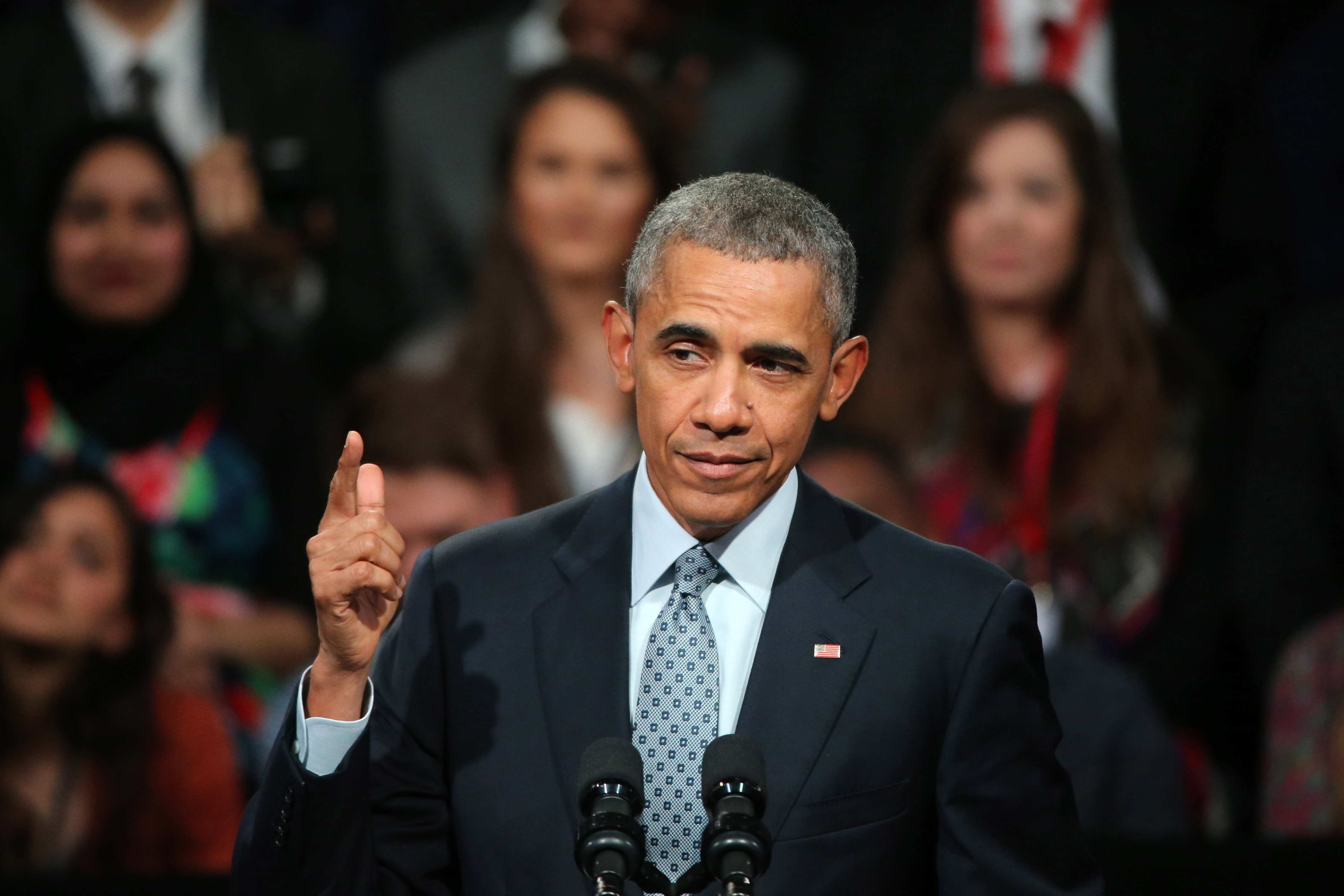Obama's treacherous embrace of Wall Street
The former president just scored one on the Democratic Party


A free daily email with the biggest news stories of the day – and the best features from TheWeek.com
You are now subscribed
Your newsletter sign-up was successful
At the 2016 White House Correspondents' Association Dinner, Barack Obama performed the last of his presidential stand-up routines before the assembled crowd of journalists and political heavyweights. He opened with a joke about Hillary Clinton and one of the political controversies that she just couldn't shake in her campaign for the presidency: paid speeches she gave to Wall Street bankers. "Here we are, my eighth and final appearance at this unique event," Obama said. "And I am excited. If this material works well, I'm going to use it at Goldman Sachs next year. Earn me some serious Tubmans. That's right."
It was a decent joke and everyone laughed. And then Obama added an additional layer of irony to the gag by waiting about three months after leaving office to accept some serious Tubmans for a Wall Street speaking engagement.
The details of Obama's Wall Street speaking fee have been exhaustively reported at this point. He's going to haul in a meaty $400,000 to give a speech at a health-care conference hosted by Cantor Fitzgerald, a capital investment firm. This is an extremely normal thing for an ex-president or other high-ranking government officials to do — they wrap up their time in public service and trip over themselves to cash in on the speaking circuit. This is how Newt Gingrich can afford penguin safaris in Antarctica. So it's reasonable, then, for Obama to line his pockets in the same way, yes?
The Week
Escape your echo chamber. Get the facts behind the news, plus analysis from multiple perspectives.

Sign up for The Week's Free Newsletters
From our morning news briefing to a weekly Good News Newsletter, get the best of The Week delivered directly to your inbox.
From our morning news briefing to a weekly Good News Newsletter, get the best of The Week delivered directly to your inbox.
Well, not really. No. For Obama, collecting mammoth Wall Street speaking fees is a repudiation of his own political brand that could cause problems for his party in the era of President Trump.
Before we get to the politics, let's take a quick look at the practical considerations at play. As a former president, Barack Obama will never, ever lack for funds. He's already reportedly signed a book deal for something like $60 million. If that money ever runs out, he could walk into any big publishing house and demand another $60 million for another book. For all the remaining years of his life, Barack Obama can and will make an obscene amount of money simply by being Barack Obama. So I'm sure the extra $400,000 he'll get for this one speech will be appreciated and well spent, but there's no actual need for him to accept a sum like this from a financial investment firm.
And that brings us to the politics. Obama rose to the presidency as the country sank into the trough of the Great Recession. He campaigned against the financial sector malfeasance that nearly collapsed the economy, promising to "bring a new era of responsibility and accountability to Wall Street." Obama's record as president when it came to Wall Street accountability was mixed — new regulations and consumer protection agencies provide some check on financial sector criminality, but the people responsible for corroding the economy with toxic mortgage debt got off clean. Taking a huge speaking fee from a Wall Street firm tells us that Obama's aspirational theory of "change" is tempered by the baser desire to cash in on one's public service wherever possible.
That is not the message a prominent Democrat should be sending as the party grapples with the Trump presidency.
A free daily email with the biggest news stories of the day – and the best features from TheWeek.com
The 2016 election should have taught Democrats that Wall Street is politically toxic and that Wall Street speaking fees are a dangerous and potent issue. Hillary Clinton never had a good answer for why her Goldman Sachs speeches did not compromise her politically, and it stung her in both the Democratic primary and the general election. Donald Trump used the speeches to argue that she was irredeemably corrupt and nurture the idea that she was just as ethically compromised as he was.
After taking office, Trump promptly handed that sword right back to the Democrats by staffing his administration with a small army of Goldman Sachs executives and promptly deregulating the financial sector. This gives Democrats an opening to reclaim some populist cred and attack Trump for being what he is: a corrupt and self-interested crony of the nation's financial elite. That task becomes more difficult when Obama — who is still the nation's most prominent Democrat and the de facto leader of the party — is collecting six-figure speaking fees from investment firms.
As a matter of political and civic health, Obama shouldn't go through with the speech. Or if he does, he should donate his fee to charity (like, say, to a group that helps distressed homeowners stave off foreclosure).
Obama is, of course, free to make money however he sees fit in his post-presidency. But there are better, less politically compromising ways to rake in those Tubmans than selling out to Wall Street.
Simon Maloy is a political writer and researcher in Washington, DC. His work has been published by The Huffington Post, The American Prospect, and Salon.
-
 How the FCC’s ‘equal time’ rule works
How the FCC’s ‘equal time’ rule worksIn the Spotlight The law is at the heart of the Colbert-CBS conflict
-
 What is the endgame in the DHS shutdown?
What is the endgame in the DHS shutdown?Today’s Big Question Democrats want to rein in ICE’s immigration crackdown
-
 ‘Poor time management isn’t just an inconvenience’
‘Poor time management isn’t just an inconvenience’Instant Opinion Opinion, comment and editorials of the day
-
 The billionaires’ wealth tax: a catastrophe for California?
The billionaires’ wealth tax: a catastrophe for California?Talking Point Peter Thiel and Larry Page preparing to change state residency
-
 Bari Weiss’ ‘60 Minutes’ scandal is about more than one report
Bari Weiss’ ‘60 Minutes’ scandal is about more than one reportIN THE SPOTLIGHT By blocking an approved segment on a controversial prison holding US deportees in El Salvador, the editor-in-chief of CBS News has become the main story
-
 Has Zohran Mamdani shown the Democrats how to win again?
Has Zohran Mamdani shown the Democrats how to win again?Today’s Big Question New York City mayoral election touted as victory for left-wing populists but moderate centrist wins elsewhere present more complex path for Democratic Party
-
 Millions turn out for anti-Trump ‘No Kings’ rallies
Millions turn out for anti-Trump ‘No Kings’ ralliesSpeed Read An estimated 7 million people participated, 2 million more than at the first ‘No Kings’ protest in June
-
 Ghislaine Maxwell: angling for a Trump pardon
Ghislaine Maxwell: angling for a Trump pardonTalking Point Convicted sex trafficker's testimony could shed new light on president's links to Jeffrey Epstein
-
 The last words and final moments of 40 presidents
The last words and final moments of 40 presidentsThe Explainer Some are eloquent quotes worthy of the holders of the highest office in the nation, and others... aren't
-
 The JFK files: the truth at last?
The JFK files: the truth at last?In The Spotlight More than 64,000 previously classified documents relating the 1963 assassination of John F. Kennedy have been released by the Trump administration
-
 'Seriously, not literally': how should the world take Donald Trump?
'Seriously, not literally': how should the world take Donald Trump?Today's big question White House rhetoric and reality look likely to become increasingly blurred
